Why are you passionate about sandalwood?
For me, sandalwood evokes nostalgia, it brings me back to the pleasant memory of my upbringing in Sri Lanka, and my student life in India. Following that, I spent the majority of my working life in Australia studying Australian Sandalwood and learning about the significance of it to Indigenous Australians which was equally important to me.
I am also drawn to Indian sandalwood’s revered history and reputation throughout the world, across culture, religion, and wellness.
Another fascination I have is around the dark side of sandalwood which stems from human greed for this rare commodity. Historically, it has funded tyrants and colonization and promoted slavery; even today, there is a large illegal market for sandalwood which is unfortunately overlooked by many authorities and businesses.
Working for sandalwood makes me feel special. I feel great pride in the responsibility to preserve and develop this ancient ingredient sustainably for future generations. I feel privileged to work with this sacred tree.
Have we only started to scratch the surface with sandalwood? Where do you see sandalwood in the future?
Buddha once said, “If the knowledge on the universe is as vast as the ocean, what we know is as much as a grain of sand picked from the beach”. This is how I see the ongoing discovery of sandalwood too.
There are multiple angles and approaches to development in regard to sandalwood, which means there are no limits to further research on this powerful, multifaceted product. Even after two millennia (the first record of sandalwood being used for its medicinal properties), we continue to discover novel pharmacological properties in Indian sandalwood. This is one of the many reasons that after 15 years, this unique tree keeps me intrigued.
I believe that sandalwood, in all its glory, will never leave human desire. And we are now in a position to meet this desire through sustainable sourcing through our plantations, ensuring a reliable source and making the future of sandalwood brighter.
Innovation is the soul of any industry; this applies especially to the sandalwood industry.
Danny Hettiarachchi
Quintis Technical Product Specialist
Can you share a little-known fact about sandalwood?
Something that fascinates me is that humans have a certain odour receptor known as OR2AT4, which is triggered by the distinctive sandalwood aroma. One of the major chemical constituents of sandalwood oil is β-santalol, which can selectively trigger this OR2AT4 to stimulate the olfactory sensation in the brain to bring positive psychological benefits. Benefits like this make me feel that humans truly are born to smell and appreciate sandalwood!
Why is research important for sandalwood?
Innovation is the soul of any industry; this applies especially to the sandalwood industry. We have evolved into a sustainable and ethical plantation-grown product as opposed to the original traditional wild harvesting. New trends in therapeutic goods, food and cosmetics require more natural ingredients which is a great opportunity for an established, sustainable commodity such as sandalwood to thrive.
I would like to see therapeutic properties, silviculture research and the development of upcycled products remaining as key interests for our industry in the coming decades. Ideally, I would love to see more academics getting involved in fundamental research on sandalwood, which would be the basis for industry research.
Can you share any career highlights?
I consider my doctoral study (research on Australian sandalwood seed oil) as a key milestone in my career. By the end of my studies, together with my doctorate, I had proudly produced a commercialised product that was promoted as a cosmetic ingredient originating from rural Western Australia. That was a very proud moment for me and I thank everyone who helped me to achieve that goal.
Apart from that, I have published several journal articles, book chapters, and conference proceedings together with scientists from around the globe. Every acceptance of these publications is a highlight and an encouragement to research further.
I am an adjunct academic at the University of Western Australia, Edith Cowan University, and Sri Jayewardenepura University (Sri Lanka). I have jointly supervised a number of undergraduate, postgraduate, and doctoral students (all of them are doing extremely well academically and professionally!) They are my greatest career achievement.
When you’re not working how do you relax/unwind/have fun?
I’m a classical music enthusiast. I learned Indian classical (Hindustani) music in my childhood and now consider myself an entry-level player in a percussion instrument known as the Tabla. Indian classical music is based on musical modes known as Raag which are a mathematical combination of notes which evoke a particular emotion. One of these modes is called ‘Raag Desh’, which I akin to the aroma of sandalwood - calming and self-grounding.
Apart from music, I do enjoy food and cooking. I love to play with flavours and am always wanting to create something different or recreate an ancient recipe. I am a keen bushwalker, however, I’m not doing enough bush walking as I'd like to be doing, this could be my new year's resolution!
I regularly volunteer at various multicultural activities around Perth and believe it or not, I was once a presenter for a radio program! As a migrant myself, I believe that understanding and respecting each other’s culture is an absolute necessity to come together as one community.

